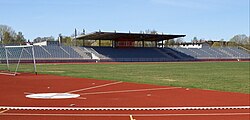
The Baltic Cup is an international football competition contested by the national teams of the Baltic states – Estonia, Latvia and Lithuania. Sometimes guests from the Northern Europe subregion are also invited: Finland has participated in the event twice, Iceland once, and Faroe Islands made a debut appearance in 2024. Though originally held annually, the competition has been biennial since 2008.
The 2009 season of the Esiliiga.
The 1997 season was the sixth full year of competitive football in the Baltic country as an independent nation. The Estonia national football team continued in the qualifying tournament for the 1998 FIFA World Cup in France. The team ended up in fifth place in the final ranking of group 4, with one win, one draw and eight losses.
2009–10 Estonian Cup was the twentieth season of the Estonian football knockout tournament organized by Estonian Football Association. Winners of the cup qualified for the second qualifying round of the 2010–11 UEFA Europa League. The defending champions were Flora Tallinn.
The 1933 Baltic Cup was held in Kaunas, Lithuania from 2 to 4 September 1933. It was the sixth time three Baltic states — Estonia, Latvia and Lithuania — came together to play a friendly tournament and determine the best team amongst them.
The 2012 Baltic Cup was a football competition which was held on 1–3 June 2012 in Estonia.
Group 7 of the UEFA Women's Euro 2017 qualifying competition consisted of five teams: England, Belgium, Serbia, Bosnia and Herzegovina, and Estonia. The composition of the eight groups in the qualifying group stage was decided by the draw held on 20 April 2015.
UEFA Group 1 of the 2019 FIFA Women's World Cup qualification competition consisted of five teams: England, Russia, Wales, Bosnia and Herzegovina, and Kazakhstan. The composition of the seven groups in the qualifying group stage was decided by the draw held on 25 April 2017, with the teams seeded according to their coefficient ranking.

The 2019 UEFA Women's Under-17 Championship was the 12th edition of the UEFA Women's Under-17 Championship, the annual international youth football championship organised by UEFA for the women's under-17 national teams of Europe. Bulgaria, which were selected by UEFA on 9 December 2016, hosted the tournament from 5 to 17 May 2019.
Group B of the UEFA Women's Euro 2022 qualifying competition consists of six teams: Italy, Denmark, Bosnia and Herzegovina, Israel, Malta, and Georgia. The composition of the nine groups in the qualifying group stage was decided by the draw held on 21 February 2019, 13:30 CET (UTC+1), at the UEFA headquarters in Nyon, Switzerland. with the teams seeded according to their coefficient ranking.
Group G of the UEFA Women's Euro 2022 qualifying competition consisted of five teams: France, Austria, Serbia, Kazakhstan, and North Macedonia. The composition of the nine groups in the qualifying group stage was decided by the draw held on 21 February 2019, 13:30 CET (UTC+1), at the UEFA headquarters in Nyon, Switzerland. with the teams seeded according to their coefficient ranking.
Group I of the UEFA Women's Euro 2022 qualifying competition consisted of five teams: Germany, Ukraine, Republic of Ireland, Greece, and Montenegro. The composition of the nine groups in the qualifying group stage was decided by the draw held on 21 February 2019, 13:30 CET (UTC+1), at the UEFA headquarters in Nyon, Switzerland. with the teams seeded according to their coefficient ranking.
The 2019–20 UEFA Women's Champions League qualifying round was played between 7 and 13 August 2019. A total of 40 teams competed in the qualifying round to decide 10 of the 32 places in the knockout phase of the 2019–20 UEFA Women's Champions League.
The 2020 Baltic Cup was the 28th Baltic Cup, an international football tournament contested by the Baltic states. Originally scheduled to be held in the summer 2020, the tournament was postponed due to the COVID-19 pandemic and rescheduled for 1 to 10 June 2021, while retaining the name 2020 Baltic Cup. Estonia won their fourth title, and their first since 1938.
The 2020 Esiliiga B was the eighth season of the Esiliiga B, the third tier of Estonian football. The season began on 8 March 2020 and concluded on 22 November 2020.
The 2021 Meistriliiga, also known as A. Le Coq Premium Liiga for sponsorship reasons, was the 31st season of the Meistriliiga, the top Estonian league for association football clubs. The season was scheduled to begin on 5 March 2021, but was delayed due to COVID-19 pandemic until 13 March and concluded on 5 December.
UEFA Group A of the 2023 FIFA Women's World Cup qualification competition consists of five teams: Sweden, Finland, Republic of Ireland, Slovakia, and Georgia. The composition of the nine groups in the qualifying group stage was decided by the draw held on 30 April 2021, with the teams seeded according to their coefficient ranking.
UEFA Group B of the 2023 FIFA Women's World Cup qualification competition consists of five teams: Spain, Scotland, Ukraine, Hungary, and Faroe Islands. The composition of the nine groups in the qualifying group stage was decided by the draw held on 30 April 2021, with the teams seeded according to their coefficient ranking.
UEFA Group F of the 2023 FIFA Women's World Cup qualification competition consists of six teams: Norway, Belgium, Poland, Albania, Kosovo, and Armenia. The composition of the nine groups in the qualifying group stage was decided by the draw held on 30 April 2021, with the teams seeded according to their coefficient ranking.

The 2023 UEFA Women's Under-17 Championship was the 14th edition of the UEFA Women's Under-17 Championship, the annual international youth football championship organised by UEFA for the women's under-17 national teams of Europe. Estonia was hosting the tournament from May 14 to 26. It was the first women's final tournament to be held in Estonia. A total of eight teams were playing in the tournament, with players born on or after 1 January 2006 eligible to participate.





